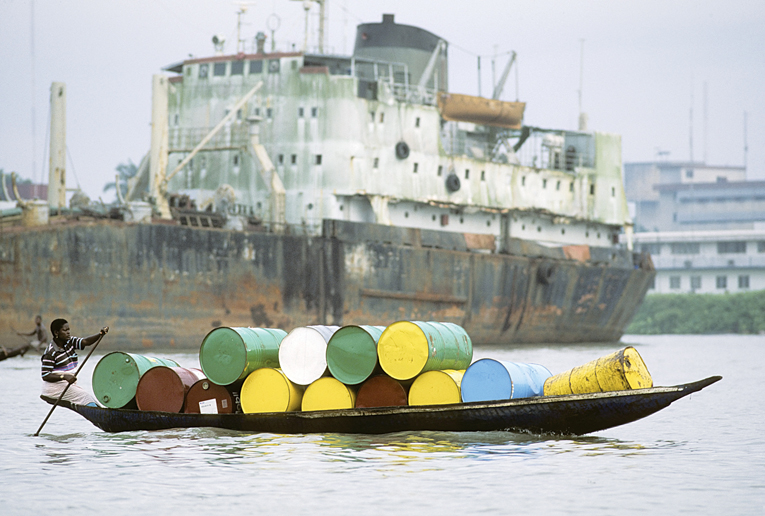A History of World Societies:
Printed Page 997
A History of World Societies Value
Edition: Printed Page 1010
Chapter Chronology
Nigeria’s boom-and-bust oil economy aggravated the challenges of nation building after independence. The British imposed the name “Nigeria” on a region of many ancient kingdoms and hundreds of ethnic groups (see Map 31.5). After the country gained independence from Britain in 1960, Nigeria’s key constitutional question was the relationship between the central government and its ethnically distinct regions. Under the federal system created after independence, each region had a dominant ethnic group and a corresponding political party. After independence Nigeria’s ethnic rivalries intensified, and in 1967 they erupted in the Biafran war in which the Igbo ethnic group in southeastern Nigeria fought unsuccessfully to form a separate nation. The war lasted three years and resulted in famine that left millions dead.
The wealth generated by oil exports in the 1970s had contradictory effects on Nigerian society. On one hand, a succession of military leaders who held power after a 1966 coup grew increasingly corrupt throughout the 1970s. When the dictator General Murtala Muhammad (1938–1976) sought to eradicate corruption, fellow officers assassinated him. On the other hand, oil wealth allowed the country to rebuild after the Biafran war. By the mid-1970s Nigeria had the largest middle and professional classes on the continent outside of South Africa, where the minority white population had exploited black South African labor and the country’s mineral wealth to its own economic benefit. Nigeria’s oil boom in the 1970s resembled Mexico’s experience: the expectation of future riches led to growing indebtedness, and when global demand and oil prices collapsed amid the global recession of the early 1980s, Nigeria faced a corrosive debt crisis.
Oil wealth allowed Nigeria to develop one innovative solution to its ethnic divisions: the construction of a modernist new capital, Abuja, modeled on Brazil’s project in Brasília (see “Populism in Argentina and Brazil” in Chapter 31). Located in the center of the country at the confluence of major regional and ethnic boundaries, Abuja symbolized equal representation in government. Urban planning reflected both the reality of ethnic divisions and the objective of integration: residential areas were divided by ethnicity, but shopping and services were located between them to encourage commingling.

Oil in Nigeria A Nigerian woman ferries fuel drums across Warri Harbor, near an abandoned oil tanker. Nigeria’s oil has brought great profits to some, but boom-and-bust cycles and corruption keep wealth out of the hands of most Nigerians. (© George Steinmetz/Corbis)
Except for an early period of civilian rule, Muslim army officers ruled Nigeria until 1998, when the brutal military dictator General Sani Abacha suddenly died. Nigerians adopted a new constitution in 1999, and that same year they voted in free elections and re-established civilian rule. Elections in 2003 ended thirty-three years of military rule. Subsequent elections in 2007 marked the first civilian-to-civilian transfer of power. Across the country and at the local level, ethnic tensions remained. Since 2000 ethnic riots have left thousands dead in the predominantly Muslim northern Nigerian states. Much of the violence can be attributed to conflicts between Muslims and non-Muslim groups that resented the introduction of shari’a (Islamic law) in the state of Zamfara in 1999. Since then, another eleven northern Nigerian states have adopted shari’a, spurring resentment from the non-Muslim populations in these states.
